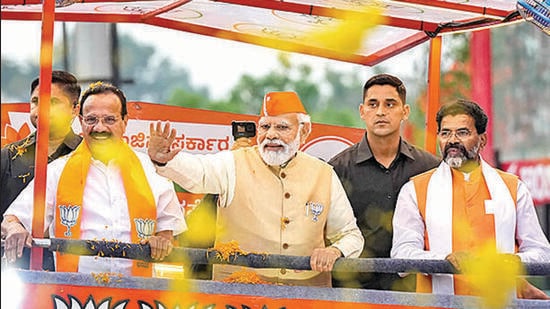Bengaluru

As Prime Minister Narendra Modi began his second series of visits to poll-bound Karnataka from Saturday, the Bharatiya Janata Party (BJP) is hoping that Modi’s response to Congress’s personal attacks could boost the party’s poll campaign. As expected, training guns on the Congress over its president Mallikarjun Kharge’s “venomous snake” barb at him, Modi on Saturday said that till now the party and its leaders have hurled at him different types of abuses 91 times.
According to the PM’s itinerary, he will address 19 public meetings in different districts besides participating in four roadshows till May 7. Political experts however say that in an election dominated by local issues, the impact of the Prime Minister’s campaign in the state will be limited.
“Even if the political campaign goes on the personal attacks, it may not make a big impact because the Karnataka voters are sensitive and they look to the parties for something more than these personal attacks. The political-cultural milieu in Karnataka expects parties to present themselves for what they have done and their promises,” said political expert Sandeep Shastri.
Talking about the impact of Modi’s statement about his being attacked by the Congress, Shastri said such a campaign could work in Gujarat but not in Karnataka. When asked about the parallels drawn between the “Maut ka Saudagar” (merchant of death) and its impact on the Gujarat election, and the Kharge’s “venomous snake” comment, he said the remarks need to be looked at in the geographical context.
“Modi is from Gujarat and the statement was made in the context of something that happened in that state. But if you look at Karnataka, there won’t be such an impact,” he said.
Apart from the personal attacks, Modi had taken on the Congress on the poll promises made by the party. As the fifth poll promise ahead of the May 10 Assembly polls, party leader Rahul Gandhi on Thursday promised free travel for women in public transport buses if it is voted to power in the state.
The Congress has earlier announced four “guarantees” – – 200 units of free power to all households, ₹2,000 monthly assistance to the woman head of every family, 10 kg rice free to all members of a BPL family, and ₹3,000 every month for graduate youth and ₹1,500 for diploma holders (both in the age group of 18-25) for two years — if the party is voted to power. The four promises find a place in the “Guarantee Card” released by the party.
Political observer A Narayana said that there is disgruntlement against the BJP over the price rise and other issues. “After the late 80s, this is the first time Karnataka is having the same party at the Centre and in the state. There is an undercurrent against the BJP. So, a campaign by the Prime Minister will have a limited impact in comparison to the larger issues. Karnataka has never had an election that was fought on a national issue or promises from the central government,” he said.
Commenting on the Prime Minister’s attack on the poll promises by the Congress, Shastri said the voters look at the party’s performance before taking these promises at their face value. “May it the Congress or BJP, they don’t have a great track record of keeping up poll promises. When one party says it will provide freebies, the other says it would provide development; in the context of the past performance, the line between the promises is very thin,” Narayana said.
He added that transplanting criticism based on the Western political concept of clientelism (concept of exchange of goods and services for political support) in India will not work, as unlike the West, the government still remains a provider of welfare schemes in India. “So the impact of welfare schemes announced by the party has to be seen,” he said.
Narayana said two questions that have to be answered to understand the impact of the Prime Minister’s rallies. “First, can it consolidate the existing vote bank for the party and second if it can bring more votes in? In the first case, it is likely that Modi can impress on the existing BJP vote bank, but in the second, in an election fought on local issues and anti-incumbency, Modi can have limited influence,” he said.



